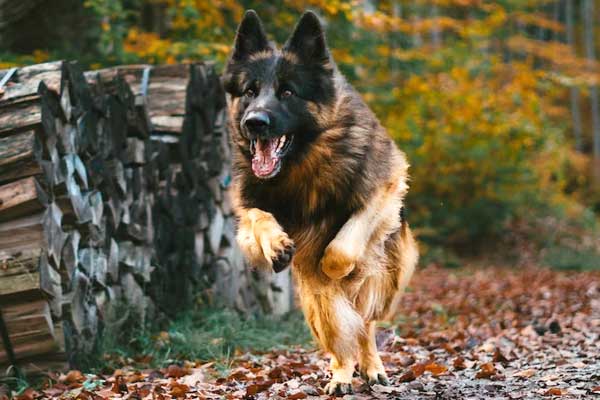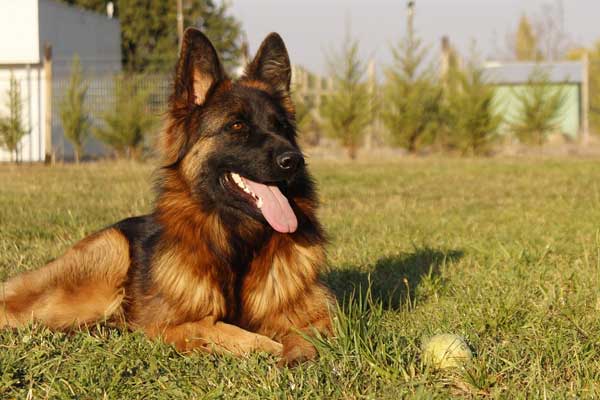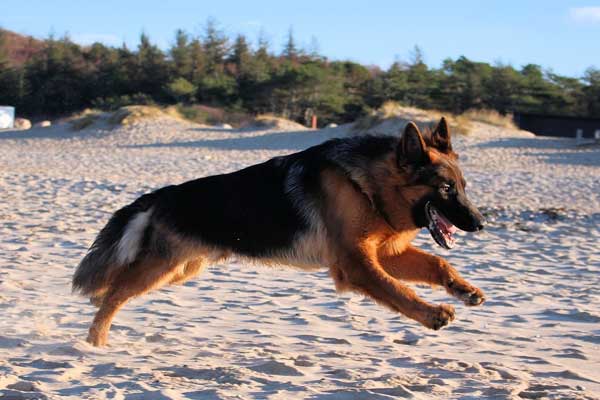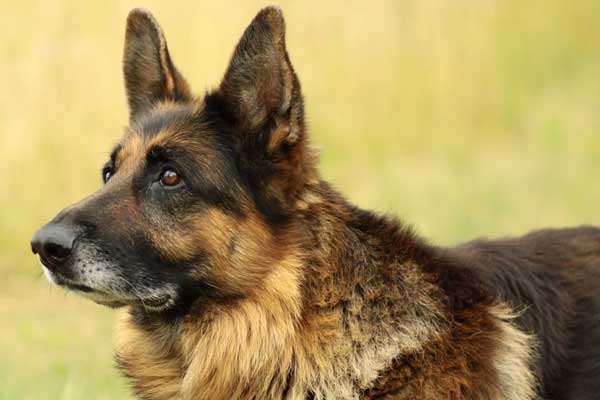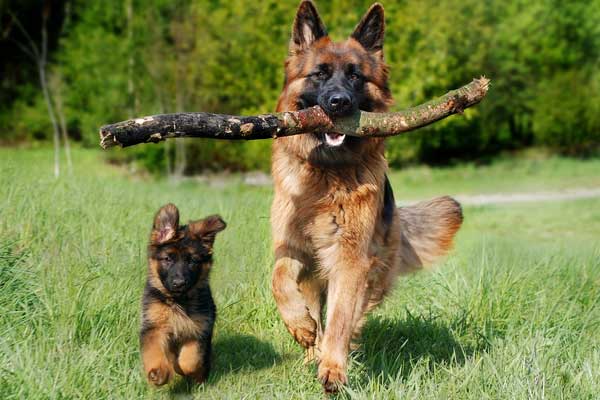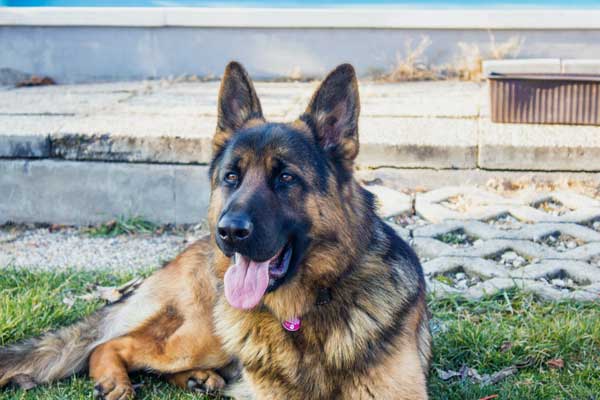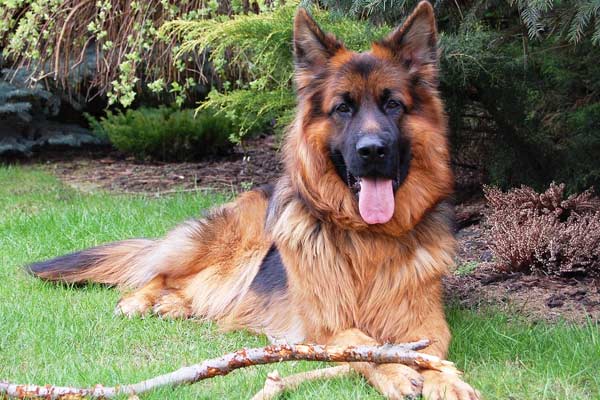15 Common German Shepherd Behavior Problems: Unraveling the ‘Mysteries’
Dogs are truly remarkable animals, possessing a suite of unique traits. They are fiercely loyal and will remain devoted to their human companion, no matter what life throws at them.
German Shepherds are primarily known for having a range of different behaviors. But it can be challenging to understand their behavior sometimes.
In this blog post, we will look at the most common behavior problems found in German Shepherds and examine possible solutions for addressing them.
Common German Shepherd Behavior Problems Overview
German Shepherds are intelligent, active, and loyal dogs. They are also known for having behavior problems that can be frustrating and difficult to manage.
Understanding that these behaviors are common and can be managed with the proper training and socialization is essential.
Common German Shepherd behavior problems include dominance aggression, fear, separation anxiety, destructive chewing, excessive barking, hyperactivity, food guarding, urine-marking, howling, mounting and humping, mouthing, nipping, and biting, whining, digging, and rolling in the dirt.
Identifying the behavior quickly and implementing a plan to address it is crucial. This will help you and your German Shepherd build a strong bond and create a safe and happy home.
Examining Common German Shepherd Behavior Problems
This section will examine each common German Shepherd behavior problem and discuss how they can be managed.
Dominance Aggression
Dominance aggression is a common and hazardous behavior issue commonly seen in German Shepherds, as they often attempt to assert themselves as the leader of their pack.
This type of aggression can manifest through growling, barking, snapping, or biting when it is not adequately addressed.
Such signs should be taken seriously and dealt with swiftly and consistently. After all, a German Shepherd needs to know that you are in charge!
Good leadership and clear communication are vital in handling dominant aggression in German Shepherds. Proper training, adequate exercise, and plenty of positive reinforcement can help your pup learn healthy boundaries and that you are the alpha.
If your pet’s aggression is too severe for you to handle on your own, don’t hesitate to ask for the professional help from a qualified trainer or behaviorist.
Fear and Anxiety
German Shepherds’ fear and anxiety are common reactions when encountering loud noises like fireworks, thunder, or sirens; unfamiliar people or animals; or sudden environmental changes.
This can cause them to display signs of fear and distress, such as cowering, shaking, panting heavily, hiding behind their owner, whining or barking excessively, or even trying to escape.
If your German Shepherd exhibits any of these behaviors, remaining calm and patient is essential. Remember that this behavior isn’t their fault — they likely feel vulnerable or scared and need your reassurance to help them cope with their fear.
Try providing physical contact through gentle strokes or hugs and using soothing words to comfort. If possible, distract your dog with a toy or treat or move them away from the source of their fear.
If you’re concerned about your German Shepherd’s fear and anxiety behavior, consider talking to an animal behaviorist. They can help you understand the root cause of the behavior and provide tailored advice to help you manage your German Shepherd’s fear and anxiety.
Separation Anxiety
Separation anxiety is a fairly common issue for German Shepherds and can manifest in various ways. When separated from their owners, dogs who are overly anxious or distressed may exhibit signs such as barking, whining, pacing, and destructive behaviors.
To help mitigate these issues, creating a daily routine for your dog is essential.
This includes regular exercise and mental stimulation. Games like hide-and-seek and puzzles can help keep their minds active and occupied, reducing stress levels.
Additionally, providing them with a comfortable place to rest that is just for them can also help reduce separation anxiety when you are away.
Destructive Chewing
Destructive chewing is a behavior that, unfortunately, many German Shepherds are prone to. This behavior occurs when a dog chews on furniture, shoes, and other objects in the home.
It’s understandable why this problem can be so challenging to manage; after all, when your beloved pup sinks its teeth into your favorite pair of shoes, it can be challenging to stay calm!
But don’t give up hope; there are many ways that you can prevent destructive chewing.
Firstly, ensure an ample supply of safe chew toys for your pup. This will provide them with a suitable outlet for their natural urge to chew and help keep their possessions safe from their jaws of destruction!
Secondly, supervise your pup when playing with these toys – if you see them heading for an off-limits object, be sure to distract them and direct them toward a more appropriate activity.
Excessive Barking
Excessive barking is another common German Shepherd behavior problem, and many factors, including boredom, fear, or excitement, can cause it.
This behavior should be addressed quickly and effectively if you want your German Shepherd to understand when it is appropriate to bark and when it is not.
It helps start by quietly rewarding your pup when it exhibits calm behavior so they understand it is your preferred behavior.
You can also reward barking less and instead provide distractions such as toys or long walks to help reduce their need to bark.
Hyperactivity
Hyperactivity can be a frustrating and challenging behavior problem for German Shepherds, as it usually results from insufficient exercise or mental stimulation.
The best way to manage a German Shepherd’s hyperactivity is to provide plenty of activities and positive reinforcement.
When a dog is hyperactive, they become overly excitable and display behaviors such as incessant barking, chewing on objects, bolting away from their owners, jumping on people or furniture, and running in circles.
Food Guarding
Food guarding is a behavior issue commonly seen in German Shepherds, wherein the canine becomes overly protective of its food. It may react aggressively to anyone or anything that comes near it.
This can be highly hazardous; therefore, addressing this behavior and taking corrective steps as soon as possible is essential.
It will help if you begin feeding your dog away from other animals or people to avoid conflict or competition. Instead of placing a bowl in the middle of the room, move it to a quiet spot where it won’t be disturbed.
You can also use rewards-based training techniques to encourage your dog to be less possessive of its food and show that it is not in danger.
For example, offer treats when others approach the bowl, or someone moves it away.
This will help your German Shepherd become more comfortable with other people and animals around their food and also help them learn that there is nothing to worry about when someone comes near.
Urine-Marking
Urine marking is an expected yet undesirable behavior problem that German Shepherds may exhibit. This behavior occurs when the dog urinates in an area to communicate ownership and mark their territory.
Urine marking can be triggered by various factors, including stress, anxiety, feeling threatened or left alone for a long time, and a lack of exercise or mental stimulation.
To avoid this behavior, it is vital to provide your German Shepherd with ample physical and mental activities stimulating their mind.
Take them on a walk, engage in fetch games, play hide and seek indoors and outdoors, or even enroll them in doggy classes. It’s also crucial that they receive plenty of attention from you!
With these measures in place, you can help ensure that your German Shepherd’s behavior remains top-notch and that they don’t need to express themselves through urine marking. After all, nobody wants their home to smell like a public restroom!
Howling
Howling is a behavior problem commonly seen in German Shepherds. A constant and prolonged vocalization characterizes it, often triggered by a sound or as a means of communication with other animals.
To effectively manage this behavior, it is vital to provide your German Shepherd with adequate exercise and positive reinforcement.
Not only will this help reduce your pup’s howling, but it will also give them a happy and healthy lifestyle. So, next time your pup starts to howl, remember that some exercise and love can go a long way!
Mounting and Humping
Mounting and humping are both common behavior problems observed in German Shepherds. This behavior occurs when a dog attempts to mount or hump another animal or person and is caused by many factors, such as dominant aggression, excitement, or boredom.
It is crucial to address this behavior promptly and consistently so that your four-legged friend understands what is acceptable and what isn’t.
Fortunately, there are several strategies you can implement to reduce your German Shepherd’s mounting and humping tendencies.
For example, redirecting the dog’s attention with a toy or a treat is an effective strategy for stopping this behavior quickly. Place your GSD in a timeout and give them something to do that will help redirect their energy.
Additionally, reinforcing positive behavior with verbal praise when your German Shepherd is not mounting or humping can help support desirable behavior.
Of course, you should also ensure your pup gets plenty of exercises and mental stimulation to reduce boredom, which can be a common trigger for this behavior.
Ultimately, with the right strategies and consistent reinforcement, your German Shepherd can learn that mounting and humping are unacceptable behaviors.
Mouthing, Nipping, and Biting
Mouthing, nipping, and biting are behaviors commonly exhibited by German Shepherds that are caused by fear, anxiety, or excitement.
Negative behaviors can become entrenched in the dog’s behavior if these behaviors are not addressed quickly and consistently.
This can lead to numerous problems, from aggression towards other animals or people to feeling overwhelmed in social situations.
Using reward-based techniques to help train the dog from these behaviors, you can ensure that your German Shepherd learns appropriate behavior in different scenarios and become a polite, confident companion.
Whining
Whining is an expected and frequently undesirable behavior in German Shepherds. This behavior is typically triggered when the animal hears a sound or wishes to communicate with another canine.
To successfully manage this type of behavior, owners of German Shepherds must provide their four-legged friend with plenty of exercises and positive reinforcement. After all, nobody wants to be around a whiny dog!
Providing plenty of positive reinforcement training is the best way to prevent German Shepherds from whining. This means rewarding your pup when they exhibit desirable behaviors and ignoring or redirecting their attention away from undesired behaviors.
Additionally, engaging in games and activities that will provide your furry friend with mental stimulation is essential in helping to reduce the occurrence of whining.
Digging
Digging is a fairly common problem among German Shepherds, and various factors can cause it. Boredom and the need for escape are two of the most common causes – when your dog is stuck inside all day with no outlets to expend energy, it may start looking for other ways to occupy itself.
Fortunately, the solution to this problem is relatively simple: provide your German Shepherd with plenty of exercises and mental stimulation.
Take them on walks and play interactive games that will help to keep them active and engaged.
Additionally, consider providing your dog with chew toys or puzzle toys they can use when you aren’t around – these can help keep them from getting bored and digging in the dirt.
Rolling in the Dirt
Rolling in the dirt is a behavior that is sadly common among German Shepherds. This problematic behavior can be seen when, for example, your dog rolls in mud or dirt to cool off their body temperature or to mark their territorial boundaries.
This bad habit can become increasingly ingrained into the dog’s daily routine if left unchecked.
So, how can you help to manage this behavior? It all comes down to giving your German Shepherd enough exercise and positive reinforcement.
Take them for a long walk daily, keep their minds engaged with interactive toys, and reward them when they don’t engage in dirt-rolling activities.
How to Socialize and Train Your German Shepherd
Training and socializing your German Shepherd is essential for addressing common behavior problems.
It is essential to start training and socializing your German Shepherd as soon as possible. This will help them become familiar with their environment and help them build a strong bond with you.
Regarding training, it is essential to be patient and consistent. Give your German Shepherd plenty of positive reinforcement when they obey your commands.
Regarding socializing, it is crucial to introduce your German Shepherd to other animals and humans in a safe and controlled environment.
It is essential to provide your German Shepherd with plenty of opportunities to explore its environment. This will help them become familiar with their surroundings and will help them become more confident.
By taking the time to train and socialize your German Shepherd, you will be helping them become the best version of themselves.
Conclusion
Common German Shepherd behavior problems can be challenging, but proper training and socialization can be controlled.
Being patient and consistent and providing your German Shepherd with plenty of exercises and mental stimulation is essential.
Training and socializing your German Shepherd, you will be helping them become the best version of themselves and create a safe and happy home.
Do you have a German Shepherd with behavior problems? What strategies have you used to manage them? Let us know in the comments below!


